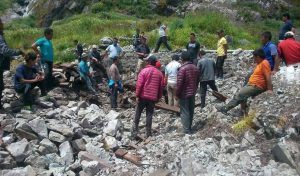A new collection archived with Paradisec (LAN1) provides documentation of the language of Langtang in Nepal. Langtang’s already small population was heavily affected when the earthquake in April 2015 triggered landslides in the Langtang valley; many of the voices in this collection are of those who died in the landslides. This project demonstrates that good documentation can be done by community members and non-linguists with the support of archivists and data managers.

While the Langtang region is well-known to as a trekking destination in Nepal, almost nothing is known about the people who live there, the language that they speak, and its relationship to other Tibeto-Burman languages. The ethnic Tibetan Langtangpa population have called the valley home for at least 4 centuries and speak a language that shares features with those of their Kyirong neighbours in the north, and Yolmo neighbours in the south.
 Follow
Follow